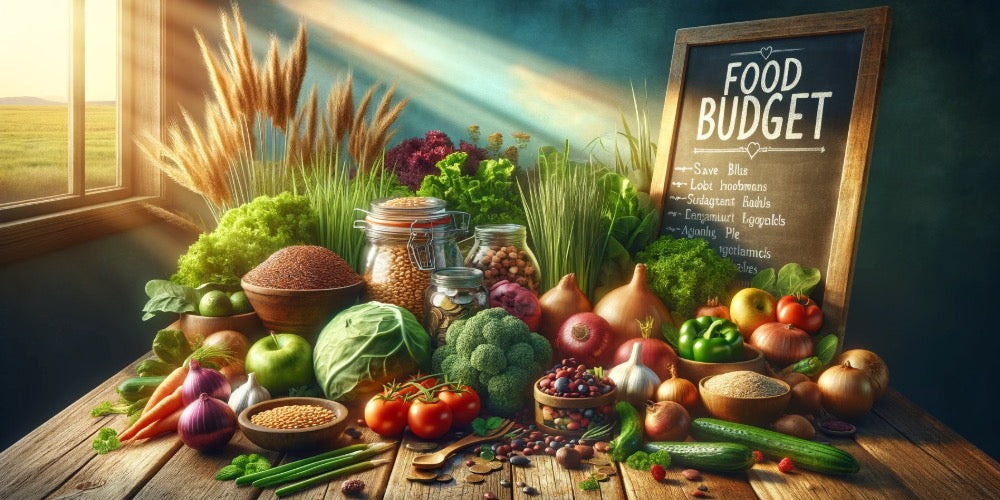In today's eco-conscious world, the allure of organic food is undeniable. With its promise of pesticide-free ingredients, non-GMO purity, and the embrace of sustainable agriculture, the organic lifestyle is the epitome of natural living.
Yet, the perception that organic equals expensive often deters budget-conscious eaters. Fear not, for affordable organic produce is not a myth. Here are five transformative tips to enjoy the nutritional value of organic eating without straining your grocery budgeting.
The Real Cost of Organic Foods
The higher price tags on organic foods often reflect the more labor-intensive practices of organic farming, which shuns synthetic pesticides and fertilizers, and adheres to stricter environmental and animal welfare standards. Although this can mean paying a bit more at checkout, it's an investment in healthier eating and sustainable agriculture.
Organizations like the Organic Trade Association and The Environmental Working Group provide insights into why these costs exist and how they contribute to the broader benefits of organic consumption. In essence, the real cost of organic foods encompasses not just their market price but also their value in promoting a healthier lifestyle and a more sustainable planet.
5 Strategies for Finding Budget-Friendly Organic Produce
1. Embrace Community Supported Agriculture (CSA)
One of the most impactful ways to align your organic eating financial planning with real-world budgets is through CSA programs. By investing in a share of a local farm's produce, you not only get a regular supply of fresh, seasonal eating options but also contribute to local sourcing and sustainable agriculture.
This direct-from-farm approach minimizes food miles and ensures you're eating the freshest produce possible.

2. Discover the Charm of Local Farm Stands and Farmers Markets
Local farm stands and farmers markets are treasure troves of economical organic produce sourcing. By purchasing directly from small family farms, you bypass the premium pricing often found in organic supermarkets.
This direct purchase not only supports the local economy but also reduces packaging, contributing to a zero waste cooking ethos. Our piece on Finding Hidden Gems at Your Local Farmers Market offers insider tips on navigating these markets for the best deals.

3. Smart Shopping at Health Food Stores and Co-Ops
Health food stores and co-ops often feature member discounts and bulk-buying options, making them ideal for organic bulk buying savings. By focusing on bulk buying essentials like grains, nuts, and legumes, you can significantly cut costs. Our article, Maximizing Your Savings at Health Food Stores, provides a roadmap to shopping smart in these establishments.
Bonus Tip: always be on the lookout for special deals and discounts on organic groceries and produce, particularly online. Many websites offer enticing discounts for first-time purchasers, so taking advantage of these offers can lead to significant savings on your organic shopping.
4. Meal Planning and Cooking from Scratch
The art of meal planning combined with cooking from scratch is a game-changer in budget-friendly organic meals.
Planning meals around seasonal produce and current sales can drastically reduce expenses. Furthermore, cooking from scratch allows you to control ingredients, avoiding the premium of pre-packaged organic goods. Dive into our guide on Efficient Meal Planning for Organic Diets to start your journey.
5. Explore Ethnic Stores, Warehouse/Bulk Stores, and DIY Options
Ethnic stores and warehouse/bulk stores often offer unique, affordable ingredients that can diversify your organic diet. From exotic spices to bulk grains, these stores can be a haven for the budget-conscious.
Additionally, embracing DIY (Do It Yourself) options like organic gardening can supply you with a personal harvest of fruits, vegetables, and herbs, further reducing your food bill. For more on this, our feature on Affordable Organic Shopping Beyond the Supermarket is a must-read.

Wrapping Up: Making Organic Affordable
Embracing organic eating on a budget is not only possible but also a rewarding journey towards healthier living and environmental stewardship. By implementing the tips shared in this post, you can enjoy the benefits of organic produce without compromising your finances.
Remember, every small step towards organic eating contributes to a larger impact on your health and the planet. So, start exploring local farmers' markets, join a community-supported agriculture program, and get creative with seasonal produce. Your journey to affordable organic eating starts with informed choices and a commitment to sustainability.
Frequently Asked Questions (FAQ): Finding Cheap Organic Foods!
Is organic really worth the extra money?
Organic food often comes with a higher price tag due to more labor-intensive farming practices, certification costs, and lower yields. However, for many, the benefits — such as reduced exposure to pesticides, support for sustainable agriculture, and potentially higher nutritional content — make the extra cost worthwhile. It's a personal decision that balances health, environmental, and financial considerations.
Which organic foods are worth buying?
When deciding which organic foods to prioritize, consider starting with the Environmental Working Group's (EWG) Dirty Dozen list, which identifies fruits and vegetables with the highest pesticide residues. Items like strawberries, spinach, and apples often top this list, making them good candidates for organic purchases.
Why is organic food so expensive in America?
Organic food in America carries a higher price tag due to several factors, including stringent USDA organic certification processes, smaller scale production, and more expensive natural fertilizers and pest control methods. Additionally, the organic supply chain is often less consolidated than conventional food systems, contributing to higher costs.
Does eating organic make a difference?
Eating organic can make a difference in several ways, from personal health to environmental impact. Organic farming methods avoid synthetic pesticides and fertilizers, leading to lower pesticide residues on food and reduced environmental pollution. Some studies also suggest organic foods may have higher levels of certain nutrients.
Can bananas be organic?
Yes, bananas can be organic. Organic bananas are grown without synthetic pesticides or fertilizers, and they must meet the same USDA organic standards as other organic produce. Organic bananas are often distinguished by a special sticker and are usually found alongside conventional bananas in grocery stores and markets.

